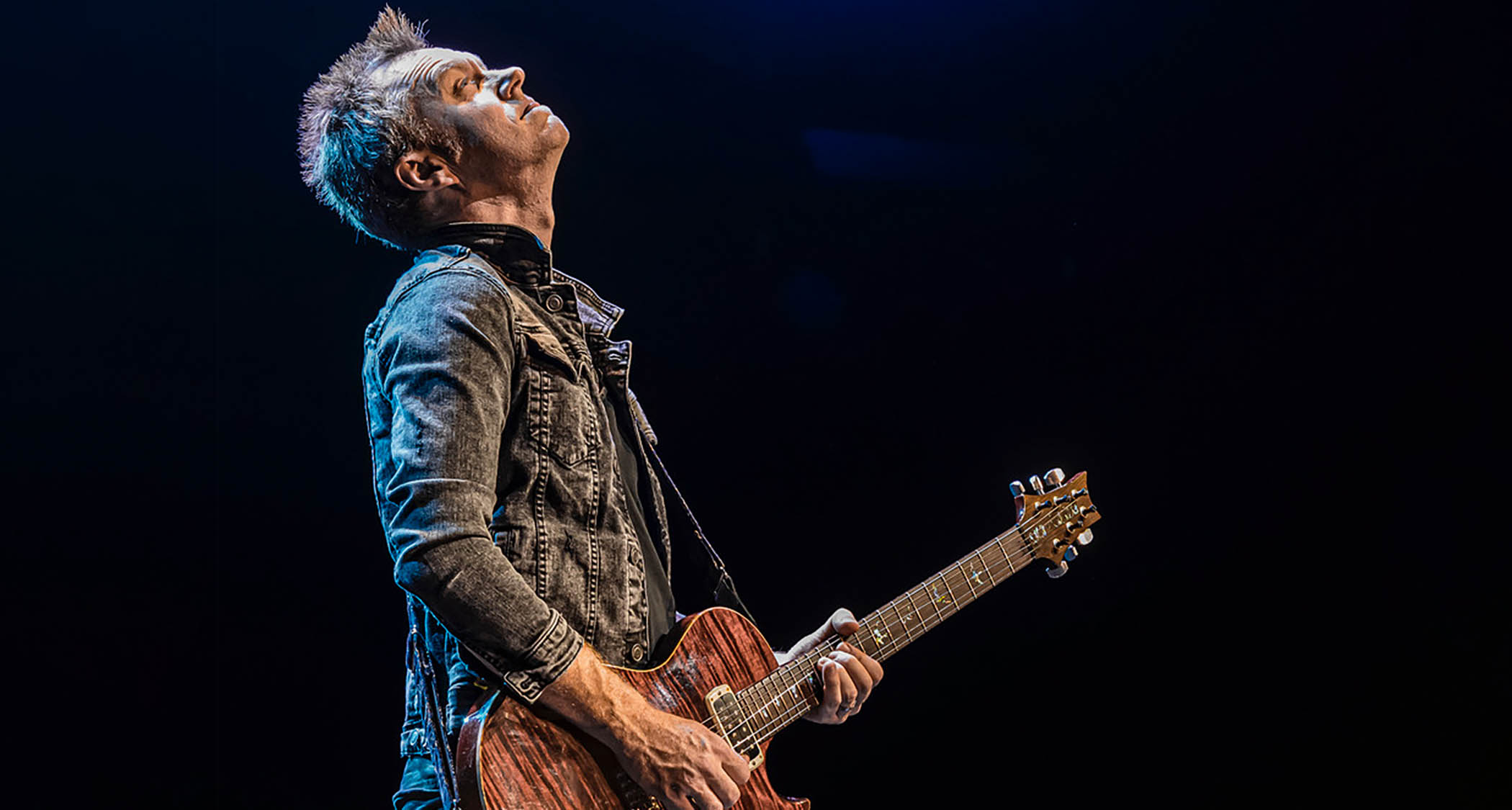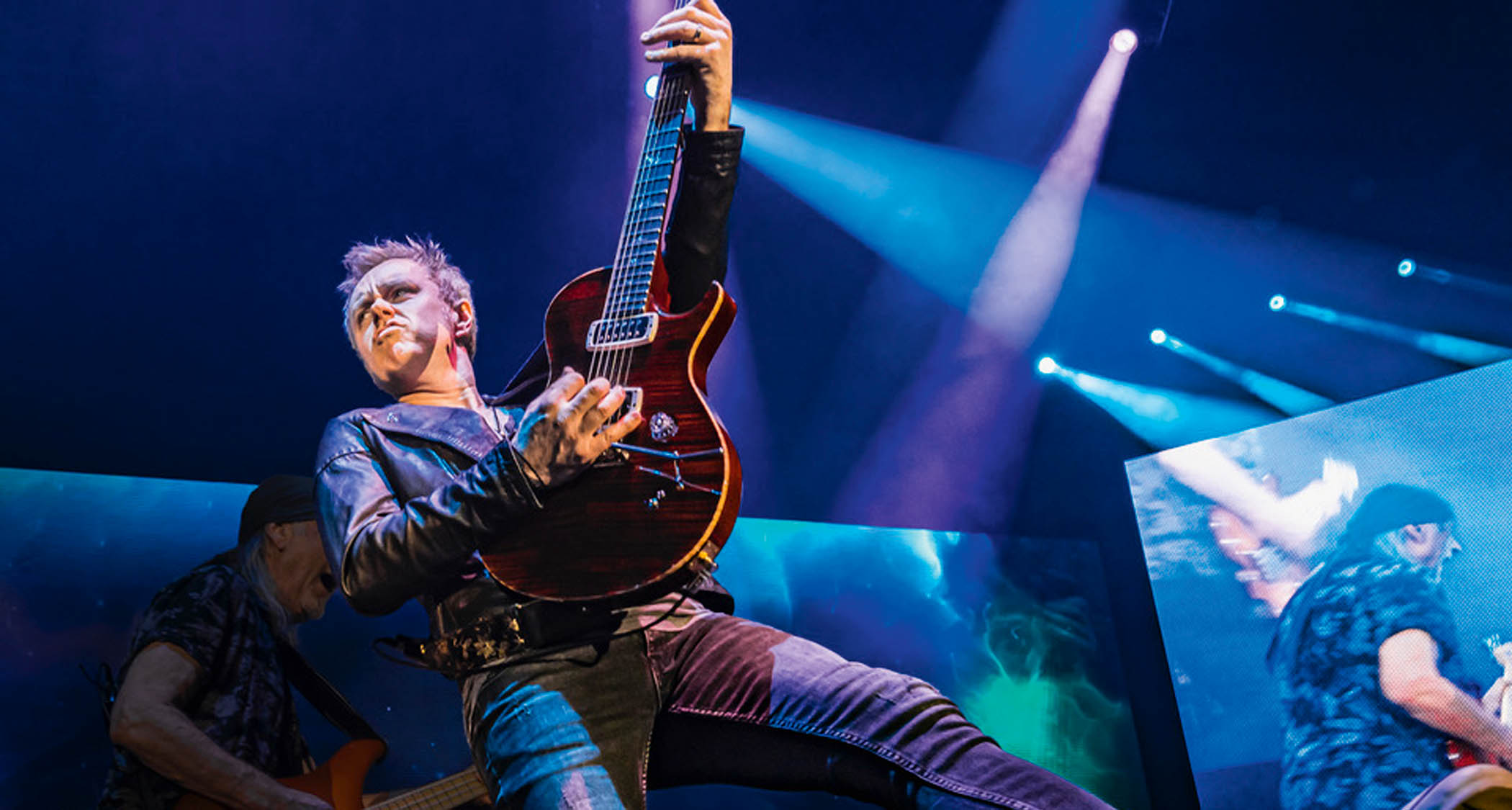“There’s no point trying to compete with Steve Morse or Ritchie Blackmore… One of the things that the guys in the band like about me as a player is I do my own thing”: How Simon McBride brought new color to Deep Purple's iconic sound
Stepping into a role once occupied by Ritchie Blackmore and Steve Morse could be intimidating, but when McBride joined Purple, he never thought twice. And yes, he'll play Smoke on the Water his way

All the latest guitar news, interviews, lessons, reviews, deals and more, direct to your inbox!
You are now subscribed
Your newsletter sign-up was successful
Simon McBride is living the dream. “When I was growing up,” he says, “there were three giants – Led Zeppelin, Black Sabbath and Deep Purple. If you’d said to a 13-year-old version of me that one day I’d be in Deep Purple, I’d have laughed.” But 30 years later, that’s exactly where the Irish guitarist has ended up.
“I’m honoured and privileged,” he smiles, “because every guitarist under the sun has a dream goal to be in a legendary rock band, and here I am doing it. I’m loving every minute of it. And to have my name attached to such a legacy is amazing.”
For sure, Simon had big shoes to fill when he joined Purple in 2022. He was replacing Steve Morse, an iconic shredder and Purple’s longest-tenured guitarist. And when it came to playing live with the band, he faced an even more daunting task – performing those classic Purple songs from the ’70s, including Highway Star, Black Night and, of course, Smoke On The Water – all of which bore the indelible stamp of one of the most revered guitarists of all time, Ritchie Blackmore.
But Simon had years of experience behind him, including stints working with two of the guys in Purple, singer Ian Gillan and keyboard player Don Airey. With his trusty PRS in hand, he was up for the challenge. And now, two years on, comes the release of his first album with the band.
Titled =1, it’s the 23rd studio album of Purple’s long career, and its creation was a remarkably stress-free experience for the new guy in the band.
“I didn’t really need to prepare myself for it,” he says. “I always knew there was a record to be done, and it was very exciting – the prospect of doing a record with Deep Purple! But there was no pressure as far as what the other guys felt it should be. We just got in a room together. From my perspective, it was very easy. I just jumped in there and went for it.”
There was no pressure as far as what the other guys felt it should be. We just got in a room together
When you’re in a role previously held by Messrs Blackmore and Morse, how much does that play on your mind?
All the latest guitar news, interviews, lessons, reviews, deals and more, direct to your inbox!
“You just have to be yourself, you know? If you try to think about what was before – and this applies to any situation – you’ll get a bit strangled musically. There’s no point trying to compete with Steve Morse or Ritchie Blackmore. I mean, nobody can do it better than them. Certainly not me! So my attitude is not to try to be like them.
“One of the things that the guys in the band like about me as a player is I do my own thing. I’m very respectful of the old songs because some of those parts that Ritchie and Steve played are huge parts of the songs, and there’s no way to change them. But for the writing sessions, it’s a combination of different influences from every member of the band. That’s what I’ve always loved about Deep Purple. There’s no rules when it comes to the songs.”
Did the album come together easily?
“Writing a song is just as hard as learning to play the guitar, but the more things you can learn from other people, the better. Listening to the early Ritchie stuff had me thinking, ‘Wow, I never would have thought of that or did that’, but now I would.
“Some of the stuff Steve did, he was a bit more progressive, which is really not my bag, but I learned from it. I said, ‘Okay, I get what he’s doing here.’ He’s going from this skill or this mode, and I learned from that, and I use it. I’m like a sponge. I soak it all up, take a dip from everyone, and use it in my own way.”
What sorts of tones were rattling around in your brain?
“I use the same rig as my live rig, so it’s Engl amps and stuff. I grew up with classic and hard rock, so that sound is always going to be in my brain no matter what rig I plug into. If I plug into a Fender, I still try to get a Marshall sound, and it’s the same with a Vox.”
Is your ’board the same in the studio?
“I sometimes use a DigiTech Whammy for various things, but in the studio, it’s mostly just my Engl amps, a Vox AC30 for some overdubs, and PRS guitars, which I use all the time. I have two signature ones [the 408] that PRS made for me – single-cuts, and they’re very versatile. I also use a Quad Cortex, which is great when you’re recording digitally because it gets things done quickly.”
About 50 per cent of the record had the solos done in the first take. I’d just go in and play, and then it’s done
What was your approach for solos?
“Solos can go one of two ways, right? I’d say about 50 per cent of the record had the solos done in the first take. I’d just go in and play, and then it’s done. The producer, Bob Ezrin, likes to do two or three different versions of the solo, so he can pick and choose.
“But I remember saying, ‘No, I ain’t gonna do any better than that!’ So there are solos that are very natural and improvised, but also other ones, like on the song Pictures Of You, where there’s a little bit more going on. It’s like a harmony guitar thing, and there’s more melody.”
And riffs?
“With riffs, it’s a weird thing. I find it hard to sit down and say, ‘I’m going to write a guitar riff, and it’s going to sound like this.’ It never happens. I’ll sit there for hours, just noodling, and nothing comes but pure crap! It’s always when I just plug in, don’t think and start playing that I’ll play the coolest riffs.”
Through the process of recording this album, did you ever get stuck?
“Oh, yeah. I’ve been stuck in a rut many times. How I get out of it is trying something different. I also started learning different skills, like modes. I know a lot of theory, but there’s an endless amount of it, so trying different things always helps.
“Even if it’s different positions on the fretboard or looking at an octave up or down, you know? You have to start trying to think outside of the box and find other ways to do it. It may sound terrible until you come up with something else, but that’s all part of the process.”

Have you adapted your style since joining Deep Purple?
“Technique-wise, no. There’s not really much to it when it comes to technique, so that wasn’t really a challenge. But the Steve Morse stuff is very different to the early Ritchie Blackmore stuff. Steve had a bit of an injury to his wrist, so he doesn’t play the way he did in Dixie Dregs. If I had to play what he did there, I would give up!
“And with Ritchie’s style, for example, there’s a solo like Highway Star that I can’t change. When you’ve got 65,000 people all singing the solo back at you note-for-note, it’s like, ‘Okay, I am so glad I did not change this at all!’ But there are other solos, like the one in Smoke On The Water, where I changed it around and put my own flavour on it.”
Have you had any exciting pedal discoveries recently?
“On stage, I’m tap dancing a lot because I’ve got so many different pedals. Probably the most obscure one is a Boss pedal called the Slicer [SL-2], which is absolute mayhem and chaos. Some people find it unusable, but I use it for some real freakout stuff in Black Night, and it’s just pure noise and a battle with my modulation.”
Steve Morse often ran a wet/dry system on tour. Is that something you’re doing, too?
“Yeah; so the main difference now is I am running a wet/dry system. I always used to run a stereo system, but the wet/dry gives more options. I also use some JAM pedals, like their chorus, the Analog WaterFall, and I’ve got an old [MXR] Phase 90 and an [MXR] Octavia. My pedalboard is huge, and people say, ‘Do you use all those?’ My answer is: ‘Yes!’”
You’ve got a lot of tones to cover!
“I use every single pedal on the ’board. It may only be for one or two bars, but it adds a bit of colour. It keeps it fresh and more interesting for people. Plus, I’m a guitar nerd, and we all love pedals!”
- =1 is out now via earMUSIC.
Andrew Daly is an iced-coffee-addicted, oddball Telecaster-playing, alfredo pasta-loving journalist from Long Island, NY, who, in addition to being a contributing writer for Guitar World, scribes for Bass Player, Guitar Player, Guitarist, and MusicRadar. Andrew has interviewed favorites like Ace Frehley, Johnny Marr, Vito Bratta, Bruce Kulick, Joe Perry, Brad Whitford, Tom Morello, Rich Robinson, and Paul Stanley, while his all-time favorite (rhythm player), Keith Richards, continues to elude him.






